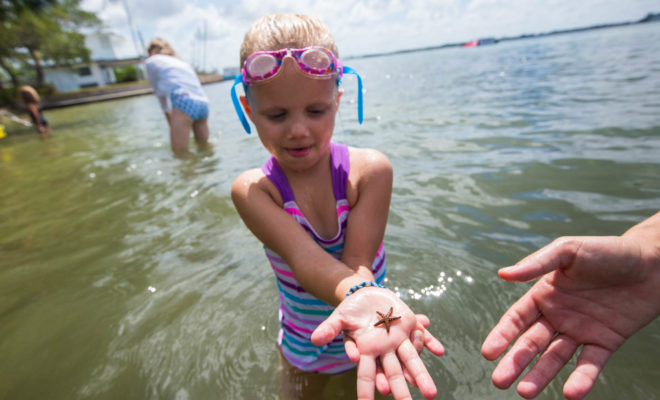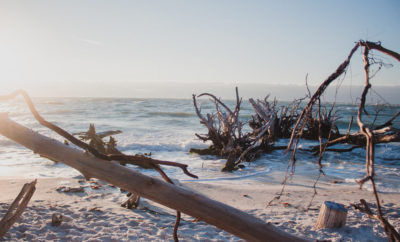
Education
Education Matters
Mote Is Awash with Educational Opportunities
By Ryan G. Van Cleave
Founded by Dr. Eugenie Clark in 1955 primarily to study sharks, Mote Marine Laboratory (originally called the Cape Haze Marine Laboratory) has grown into a top-tier independent, not-for-profit marine research organization that does far more than just study sharks. Currently, they have more than 30 Ph.D. scientists who call the Lab home, and they conduct research in six of the world’s seven continents. They respond to stranded sea life 24-7. They research red tide solutions. They study ocean acidification. In short, they’re on the front-end of the latest marine science. Yet most know Mote as the area’s best aquarium, housing over 100 species of marine life and featuring a stunning 135,000-gallon outdoor shark tank.
Mote’s commitment to marine science is only equaled by their commitment to education. As their website says: “We are scientists, explorers and stewards of the ocean. Driven by research, education and excitement, we work to create a better environment for ourselves and our children. The answers are in the ocean. Together, we will find them.”
It all starts with the passionate employees and volunteers of their Education Department. Part of Mote’s mission is to find ways to educate future generations, adults, and policymakers about conservation and sustainability using vital marine resources. “Enhancing science and ocean literacy is crucial,” says Aly Busse, Assistant Vice President for Education at Mote. “It’s part of who we are.”
One of the primary things the Education Department does is provide opportunities for area kids to have positive science experiences, whether that’s when kids aren’t in school or to simply supplement their in-school learning. “We try to get kids into nature,” says Busse. “We take them snorkeling, field sampling, picking up critters, kayaking. Our goal is to get them thinking about the environment in a scientific way. ‘Here’s a problem,’ we say, ‘so how do you go about solving it?’”
No matter your age, Mote has offerings for you, starting with the newly-named Shark Pups and Grownups (formerly Mommy and Me), which is for “ages 2-5 with their adults” on Tuesdays, Thursdays, and Saturdays each week from fall to spring, with different themes for each session such as Totally Turtles, Snazzy Shark Teeth, and Super Sponges. The youngest little scientists and adults also have the Exploring the Bay program, where they explore the coastal habitats of Sarasota Bay, wading into the water and collecting marine animals with nets. “Kids love getting out into the water like that,” says Busse.
Spring break is an extremely popular time for older kids to try out Mote’s educational offerings. The single-day programs start March 18th and run through the 29th, and this year, there are far more water-based programs thanks to growing interest in those kinds of activities. This year’s topics “Mucus, Muck & More,” “Teeth, Tongues & Tummies,” “Flukes, Flippers, Fins & Feet,” and more. Plus there’s “Fun In Fishing,” a new specialty camp that teaches grade 6-8 students about local fish as well as sustainable fishing and fisheries. They get to practice different fishing techniques and visit Mote’s Aquaculture Park.
About three years ago, the Education Department launched a community engagement program that has become a smash success. They strategically partnered with local organizations that serve under-represented youth, such as the Boys & Girls Clubs of Sarasota and Manatee Counties, and Girls Inc. “We built entire programming to reach these groups, and it’s all free,” reports Busse. Last year alone, about 10,000 of these students were impacted by this program.
All told, nearly 40,000 people benefited from Mote’s education programming last year. Lots of that came from on-site full-day field trips to Mote—teachers love how Mote’s educators work so closely with the schools to develop lesson plans that work hand-in-hand with classroom curricula and meet the Sunshine State Standards in science education. But many of the students were reached via off-site programming, too, through virtual learning programs, outreach programs, and free classroom kits that teachers can check out like a library book. For example, teachers can check out dolphin skeletons and corresponding curricula created by Mote educators for a DIY classroom experience where students get hands-on time with real dolphin bones and the process of science. Versions of this kit are available for middle and high school classrooms, as well.
One of the high-impact trends in science education is offering workshops for the teachers, so they can have up-to-date access to real science. That kind of knowledge and training helps them provide authentic science experiences for all of their students versus relying on formulaic, boring labs. It’s all about working in real-world settings and dealing with problems scientists—and others—face today. “We strive to have students do more inquiry-based work,” Busse explains. “It’s so much more effective than something that’s prescriptive. The scientific process can be wonderfully messy as they work through things, problem solve, and get creative. That’s how you make it fun and memorable.”
While the goal is more to increase conservation and environmental awareness than to create future scientists, the spark for the world of science roars to life in some, such as Englewood’s own Sean Russell. He grew interested in protecting marine environments after learning about them in his 4-H marine science projects and through a Mote summer camp and internship. In 2011, he launched the Youth Ocean Conservation Summit at Mote, which provides youth with the skills needed to undertake their own conservation projects—it’s gone on to become an annual event that has inspired thousands of students nationwide to become involved in marine conservation. The summit has been modeled in ten cities throughout the US in partnership with aquariums and conservation organizations. And it all started with Sean’s positive early experiences in nature.
Whether you’re a guppy, an adult, or somewhere between, the Education Department at Mote has something for you. And Busse adds that while science is at the heart of all they do, “We do everything we can to ensure that it’s a lot of fun, too.”
For More Information about Mote Marine Laboratory’s Education Department, please visit www.mote.org, or call 941.388.4441.







You must be logged in to post a comment Login